The Forties and Fifties, seen through the eyes of Shostakovich and the Pet Shop Boys, were the historical centre of gravity for last night’s courageously broad Proms programme. Bartók’s Violin Concerto No. 2, a gently serialist folk exploration from 1937-8, introduced the era, with the Soviet composer’s 10th Symphony and the Pet Shop Boys’ retro biography of Alan Turing (**) offering markedly contrasting interpretations through their depictions of Stalin and the Enigma-decoding, convicted homosexual mathematician.
Tavener’s Gnosis, opening Prom 7 (****), was the exception. Through a setting of religious texts from four traditions, he explored the concept of gnosis, or spiritual knowledge, striking a mood of timelessness, where every other piece in the two proms had definite historical roots. However, to cover such ground in a mere 12 minutes, corners had to be cut, and it sounded more like a collage of gestures than a completed work. The low drone, or eternity note, in the basses, was atmospheric; mezzo Sarah Connolly sang the texts with delightful liquidity; but the quotation of Mozart’s Piano Concerto K453, was clumsy and, all told, it sounded as if the ideas for the commission, completed in the last year of the composer’s life, had not been fully digested.
Bartók’s Second Violin Concerto is an altogether subtler, more delicate work. Attempting both to “out-Schoenberg” Schoenberg by demonstrating grasp of the 12-tone system, while simultaneously exploring the folk traditions he loved and studied so meticulously, the piece is a gentle triumph of creative synthesis, in which the folk elements colour the serialism, while the serialism adds depth and nuance. German violinist Isabelle Faust conveyed the combination of the cerebral and rootsy in a nimble, vivid and fresh interpretation, which picked out the fine, lyrical detail of the score with precision and grassy-fresh phrasing, matched phrase for phrase by the Czech conductor Jiří Bělohlávek’s tenderly precise direction of the orchestra. Her encore, a folksy, swinging rendition of the Sarabande from Bach’s Partita No. 1 showed a similarly invigorating approach. One could only wish that it was performed in a more intimate venue, where the delicacy of the string playing, in particular, could better be appreciated.
The oddity was as nothing compared to the sampling of Gordon Brown’s announcement of Turing’s pardon
That’s not something usually required of a performance of Shostakovich, though Bělohlávek’s interpretation of the epic 10th, a watershed piece in which the composer’s acrimonious resentment of Stalin is released soon after the dictator’s death in 1953, focused, like his Bartók, on the score’s more delicate, lyrical features. Key among these are the numerous solos for woodwind: bassoon, oboe, and duets of clarinet and piccolo all sing with charisma and lyricism: it’s easy, if fanciful, to read these as the voices of individuality emerging hopefully and nervously from a period of oppression. Despite the variety in individual sound, they share a yearning, edgy quality, from the strained, keening bassoon, to the anxiously piping piccolo. Belohlávek directed the savage second movement and ambivalent allegro of the finale with precision and finesse rather than explosive force, which emphasised, refreshingly, the piece’s psychological focus and menace.
The Pet Shop Boys’ Proms debut (**), and tribute to the important Bletchley Park mathematician Alan Turing, was entitled A Man from the Future; ironically, it turned out, for a piece that felt defiantly old-fashioned. It was preceded by two short sets of the Boys’ songs, firstly just for orchestra, and secondly sung by Chrissie Hynde, joined for the last few songs by Neil Tennant himself. Snatches of the Pet Shop Boys’ tunes were discernible during Overture to “Performance”, an orchestrated medley of the Pet Shop Boys’ hits, but apart from that, its precise, jaunty rhythms and swooping melodies were not unlike a piece of Eric Coates on the BBC Light Programme.
The choice of Hynde as soloist was a mistake. Her smoky, crackly voice has great character, but didn’t project sufficiently to be heard over the orchestra, and her tendency to smear the rhythm played havoc with the orchestra’s adherence to the beat. (Light music needs a martinet’s rhythmical accuracy.) Tennant was a much better soloist in this setting, projecting clearly and having a more athletic sense of timing, though bizarrely, for someone associated so closely with a slick, synth-pop aesthetic, his role couldn’t dilute the piece’s defiantly retro sound.
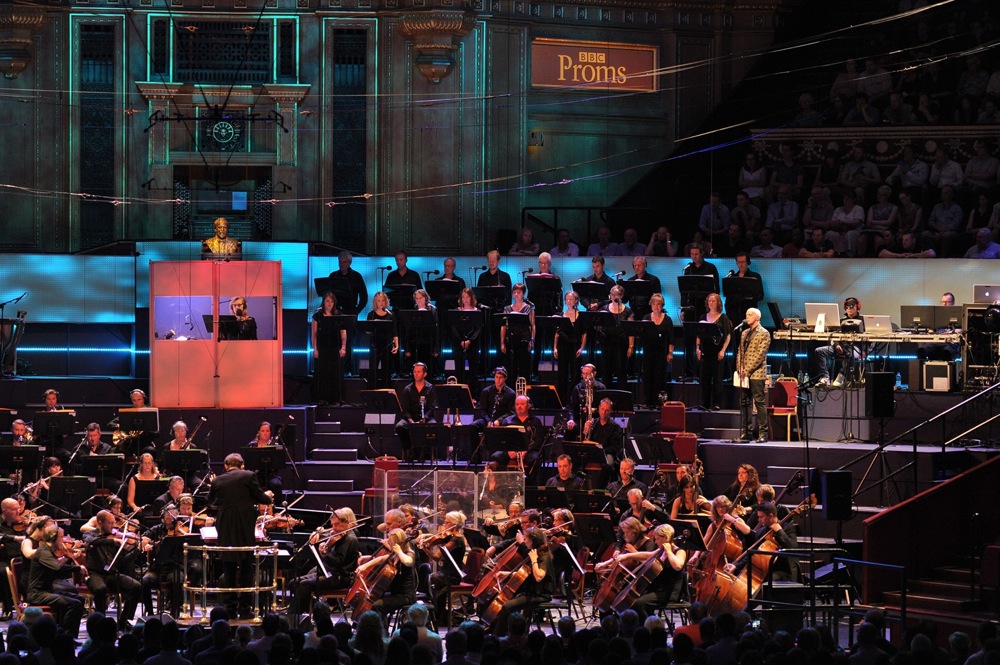 A Man from the Future took its educational role very seriously. Divided biographically, each section contained detailed narration describing that part of Turing’s life, read by Juliet Stevenson, hidden rather strangely in a little box at the top of the stage (pictured). Her voice was too heavily amplified, making her sound like a disembodied presence in a sci-fi epic, though the oddity was as nothing compared to the sampling of Gordon Brown’s announcement of Turing’s pardon. There was nothing wrong with what Brown said, but such a distinctive political presence destroyed what was left of the dramatic illusion, dragging the piece foursquare into documentary territory. The accompanying music was pleasantly melodic, with catchy electronic effects, but so dominant was the narration, that the music was never much more than a TV-style effect.
A Man from the Future took its educational role very seriously. Divided biographically, each section contained detailed narration describing that part of Turing’s life, read by Juliet Stevenson, hidden rather strangely in a little box at the top of the stage (pictured). Her voice was too heavily amplified, making her sound like a disembodied presence in a sci-fi epic, though the oddity was as nothing compared to the sampling of Gordon Brown’s announcement of Turing’s pardon. There was nothing wrong with what Brown said, but such a distinctive political presence destroyed what was left of the dramatic illusion, dragging the piece foursquare into documentary territory. The accompanying music was pleasantly melodic, with catchy electronic effects, but so dominant was the narration, that the music was never much more than a TV-style effect.
Strip away with sparkly veneer, and this was essentially a public information broadcast, approaching its subject with a disappointing literalism more Soviet than the Shostakovich. Little attempt was made to create atmosphere, or escape from the biographical facts into Turing’s soul. It had the aesthetic quality of an installation in a municipal museum, which, on insertion of ten pence, plays a five-minute narration describing the life of the Huguenots in Stevenage.
Turing’s greatness, and his abysmal, though not atypical, treatment by the authorities, are well known and no longer controversial. A biographical film about Turing, The Imitation Game, with Benedict Cumberbatch, will be released at the London Film Festival this autumn. Once that makes the events of his life common knowledge, who will want to plod through A Man From the Future again, when it sounds so much like a piece from the past?

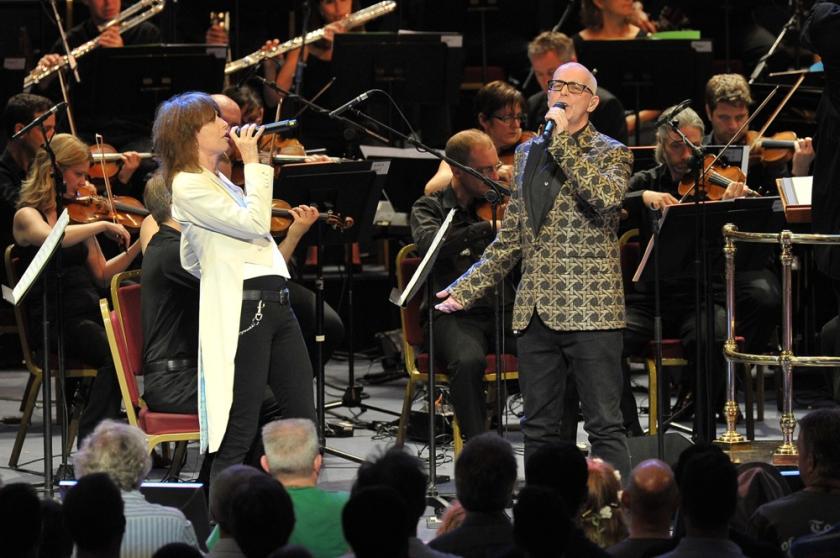




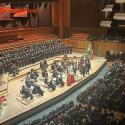






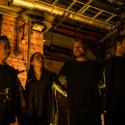
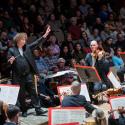
Add comment